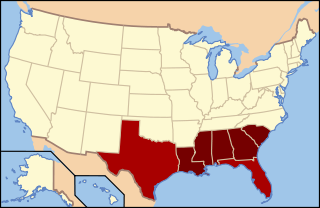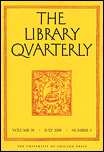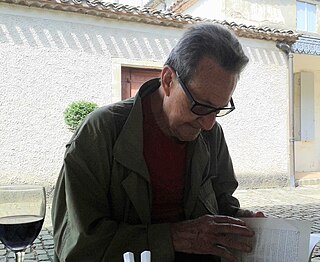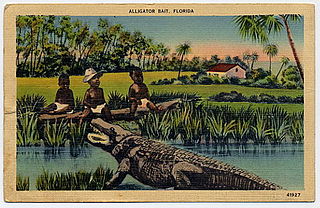
East Florida was a colony of Great Britain from 1763 to 1783 and a province of Spanish Florida from 1783 to 1821. Great Britain gained control of the long-established Spanish colony of La Florida in 1763 as part of the treaty ending the French and Indian War. Deciding that the territory was too large to administer as a single unit, Britain divided Florida into two colonies separated by the Apalachicola River: East Florida with its capital in St. Augustine and West Florida with its capital in Pensacola. East Florida was much larger and comprised the bulk of the former Spanish territory of Florida and most of the current state of Florida. It had also been the most populated region of Spanish Florida, but before control was transferred to Britain, most residents – including virtually everyone in St. Augustine – left the territory, with most migrating to Cuba.

The Deep South or the Lower South is a cultural and geographic subregion of the Southern United States. The term was first used to describe the states which were most economically dependent on plantations and slavery. After the American Civil War ended in 1865, the region suffered economic hardship and was a major site of racial tension during and after the Reconstruction era. Before 1945, the Deep South was often referred to as the "Cotton States" since cotton was the primary cash crop for economic production. The civil rights movement in the 1950s and 1960s helped usher in a new era, sometimes referred to as the New South.

Fort Mose, originally known as Gracia Real de Santa Teresa de Mose, and later as Fort Mose, or alternatively, Fort Moosa or Fort Mossa, is a former Spanish fort in St. Augustine, Florida. In 1738, the governor of Spanish Florida, Manuel de Montiano, had the fort established as a free black settlement, the first to be legally sanctioned in what would become the territory of the United States. It was designated a US National Historic Landmark on October 12, 1994.

The Library Quarterly is a quarterly double-anonymous peer-reviewed academic journal covering library science, including historical, sociological, statistical, bibliographical, managerial, psychological, and educational aspects of the field. It is published by the University of Chicago and was established to fill a need for investigation and discussion set forth by the American Library Association in 1926. The editors are Paul T. Jaeger, and Natalie Greene Taylor, with associate editors Jane Garner and Shannon M. Oltmann.

The University of Texas Press is a university press that is part of the University of Texas at Austin. Established in 1950, the Press publishes scholarly books and journals in several areas, including Latin American studies, Texana, anthropology, U.S. Latino studies, Native American studies, African American studies, film & media studies, classics and the ancient Near East, Middle East studies, natural history, art, and architecture. The Press also publishes trade books and journals relating to their major subject areas.

René Lemarchand is a French-American political scientist who is known for his research on ethnic conflict and genocide in Rwanda, Burundi and Darfur. Publishing in both English and French, he is particularly known for his work on the concept of clientelism. He is a Professor Emeritus at the University of Florida, and continues to write, teach internationally and consult. Since retiring he has worked for USAID out of Abidjan, Côte d'Ivoire as a Regional Consultant for West Africa in Governance and Democracy, and as Democracy and Governance advisor to USAID / Ghana.

The China Quarterly (CQ) is a British double-blind peer-reviewed academic journal established in 1960 on contemporary China including Taiwan.
The William and Mary Quarterly is a quarterly history journal published by the Omohundro Institute of Early American History and Culture. The journal originated in 1892, making it one of the oldest scholarly journals in the United States. Currently in its third series, the Quarterly is the leading journal for studying early American history and culture. It ranges chronologically from Old World–New World contacts to about 1820. Geographically, it focuses on North America—from New France and the Spanish American borderlands to British America and the Caribbean—and extends to Europe and West Africa. Though grounded in history, it welcomes works from all disciplines bearing on the early American period—for example, literature, law, political science, anthropology, archaeology, material culture, and cultural studies.

University of Florida Center for African Studies (CAS) is a center within of the College of Liberal Arts and Sciences (CLAS) at the University of Florida (UF). The Center provides teaching and research into issues of African languages, humanities, social sciences, agriculture, business, engineering, education, fine arts, environmental studies, conservation, journalism, and law.

The Journal of Modern African Studies is a quarterly academic journal of African studies covering developments in modern African politics and society. Its main emphasis is on current issues in African politics, economies, societies, and international relations. The journal is published by Cambridge University Press and as of 2018 its editors-in-chief are Ian Taylor and Ebenezer Obadare. It was edited by Leonardo A. Villalón and Paul Nugent from 2012 to 2017, and by Christopher Clapham from 1997 to 2012. David Kimble served as its founding editor from 1963 to 1997.
The Society for the Study of the Multi-Ethnic Literature of the United States (MELUS) is a scholarly society established in 1974. MELUS publishes a quarterly academic journal, MELUS. The aim of the Society is "to expand the definition of American literature through the study and teaching of Latino American, Native American, African-American, Asian and Pacific American, and ethnically specific Euro-American literary works, their authors, and their cultural contexts".

Slavery in Florida is more central to Florida's history than it is to almost any other state. Florida's purchase by the United States from Spain in 1819 was primarily a measure to strengthen the system of slavery on Southern plantations, by denying potential runaways the formerly safe haven of Florida.

The 1956 United States presidential election in Florida was held on November 6, 1956, as part of the concurrent United States presidential election. Florida voters chose ten electors, or representatives to the Electoral College, who voted for president and vice president.

The sit-in movement, sit-in campaign or student sit-in movement, were a wave of sit-ins that followed the Greensboro sit-ins on February 1, 1960 in North Carolina. The sit-in movement employed the tactic of nonviolent direct action and was a pivotal event during the Civil Rights Movement.
Maxine Deloris Jones is an American historian. She is a professor of history at Florida State University. Jones co-authored a book on African American history in Florida and another on Talladega College. She was the principal author of a report on the Rosewood Massacre for the Florida Legislature.

Depicting African-American children as alligator bait was a common trope in American popular culture in the 19th and 20th centuries. The motif was present in a wide array of media, including newspaper reports, songs, and visual art.











